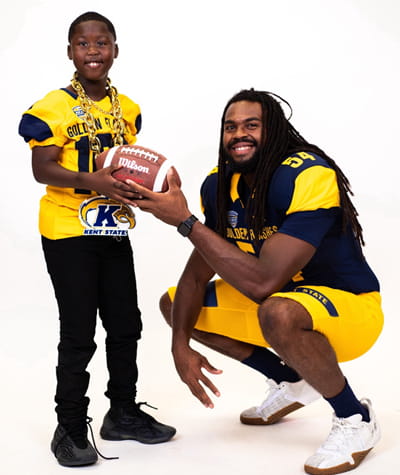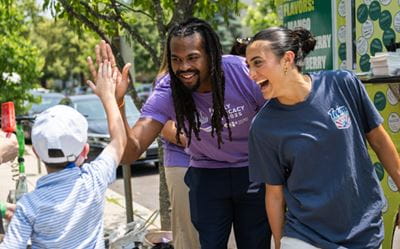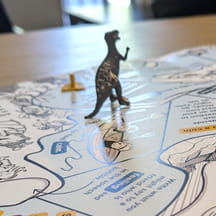“Kingston showed me that life is bigger than a football game.”
Cameron Golden, a former Kent State University offensive lineman, says he gained a little brother through Team IMPACT, a program that matches children with serious illnesses or disabilities with college athletic teams.
Cameron and his teammates matched with 13-year-old Kingston, who lives with a genetic condition called Stickler syndrome and Pierre Robin sequence.

Kids with complex medical needs often feel disconnected from social supports due to their medical treatments, which may include frequent hospital stays and school absences. Team IMPACT helps fill that gap, fostering meaningful long-term relationships between collegiate players and patients and their families.
Through Cameron’s involvement with the program, he attended the Children’s Hospital Association’s Family Advocacy Day in Washington, D.C. in June. He spent time with patients and families, met with members of Congress, and shared how Team IMPACT has made him a better advocate for kids.
Cameron was also selected to be a Team IMPACT Fellow, where he worked to raise awareness of the program and increase participation. Read more about his involvement with Team IMPACT and Family Advocacy Day.
Why have you described Team IMPACT as the best part of your college experience?
Service has always been an important value for me growing up. And when I heard that Team IMPACT is focused on service and giving, it really struck my core. It really makes my heart happy — from the connections I’ve made, the families I’ve met, and the testimonies I’ve heard.
Once I got involved, there was no way I was turning back from such a unique experience. The program is a blessing because of how fulfilling it is and how much it makes me smile.
Kingston is truly like family. He gained 100 brothers through the connection with our team and alumni. We test each other. We go get ice cream. Our families have integrated so much that his mom sends me his basketball schedule.
How has the relationship taught you resilience?
My senior year playing football, I tore my MCL. I was in a very bad state. While I was struggling with that, I sat down with Kingston before a game, and he looked at me and said, ‘That doesn’t really matter, there’s so much more out there.’ That shifted my mindset.
I also remember one time we had this huge winning streak, and then we lost an important game at home. The whole team was mad and upset.
Kingston told us, ‘Guys, we can just go win again.’
Moments like that were huge. He speaks volumes. That’s why I tell Team IMPACT Fellows all the time that we make an impact on these kids, but they make 10 times more of an impact on us.
Can you describe your Family Advocacy Day experience?
It was a transformative experience. It was amazing hearing the testimonies of families and how the political landscape impacts them. It made me want to be more educated and aware of what is being passed in legislation.

I consider Kingston like family, and so I want to advocate more for my family and the other kids that I met.
I like to say that sometimes I’m not meant to speak about certain things because I don’t know certain things. However, as a Team IMPACT Fellow and student-athlete, I can use my voice as a megaphone to spread awareness of and advocate for children’s health.
What have you learned through Team IMPACT?
I learned how to manage time, build connections, and be a leader. I was also educated on rare diseases and struggles beyond my own experience.
It has helped me be a better advocate for inclusivity and accessibility. Once, I noticed the ADA button for a door on campus wasn’t working, so I let someone know that it needs to get fixed. Team IMPACT has made me more aware and well-rounded in my everyday life.
What are you going to remember most about the program?
I’m going to think of Kingston’s smile. If I’m having a bad day, it will be a grounding reminder of what really matters.
The NCAA would be a better place with more Team IMPACT matches, and I hope every student-athlete can picture their teammate’s smile.


